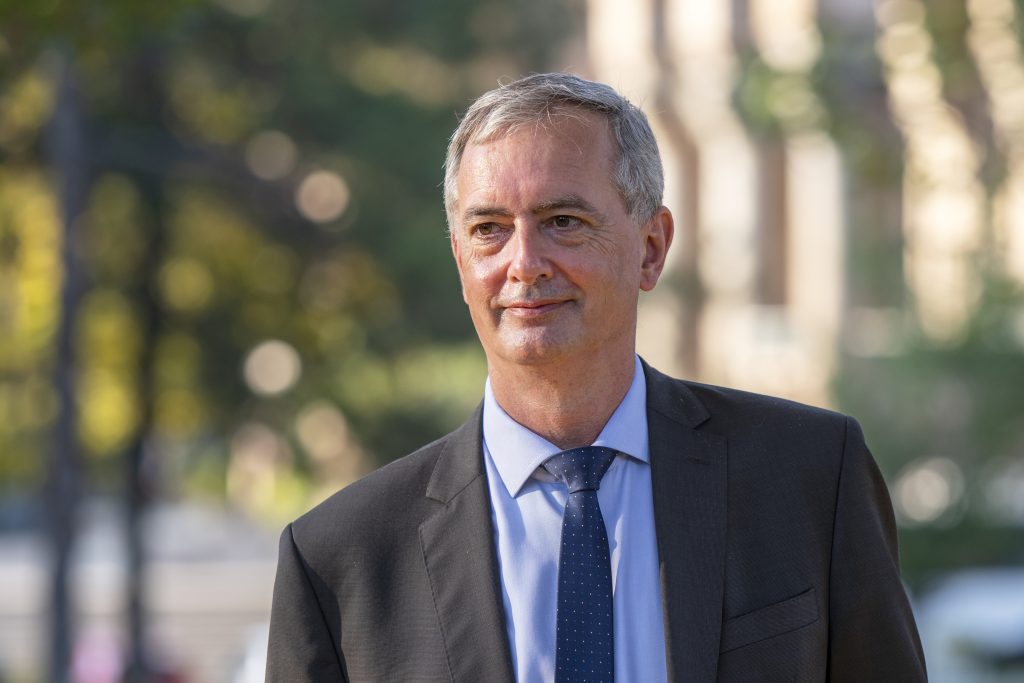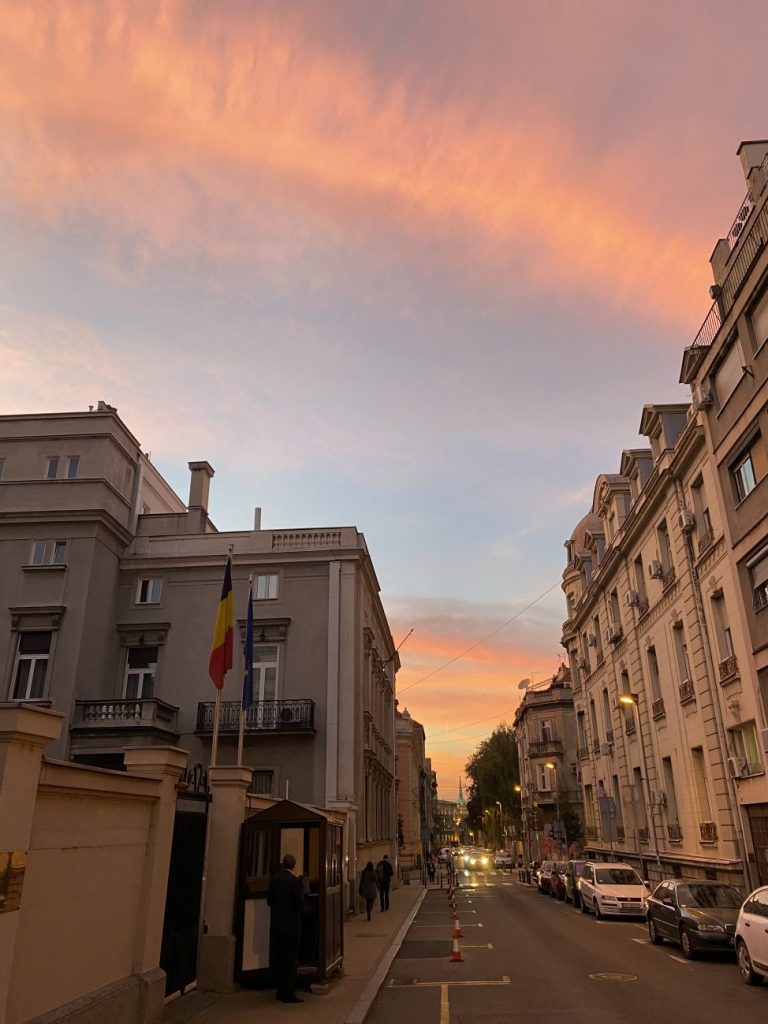Bilateral trade has suffered during the COVID crisis, but I am quite confident that trade and investment will get back to the usual growth path
“With both governments and parliaments now fully operational, I expect an increase in high level contacts and, when Covid subsides, a resumption of people –to- people encounters. The Brussels Belgrade cooperation may become a source of inspiration for tackling urban challenges. “, said H.E. Adam Koenraad, Ambassador of Belgium for the special supplement Focus ON Belgium.

Belgium is a staunch supporter of Serbia’s EU integration. How would you assess the European Commission’s recent annual progress report about Serbia?
The Commission report offers an elaborate diagnosis of Serbia’s progress to full EU membership. It is the outcome of a complex assessment process, to which numerous Serbian and European stakeholders in Serbia’s EU future have contributed. The result is a balanced report that highlights some advances Serbia has made, especially in the macro-economic framework, and also with regard to the relaunch of the Belgrade-Pristina dialogue, where the constructive Serbian attitude was recognised. There are, however, also important shortcomings: too little or no progress was made in comparison to last year’s report, in areas that are mostly related to the so-called ‘fundamentals’, i.e. the rule of law, independence of the judiciary, democratic governance, the fight against corruption and organised crime, or media freedom. The COVID-19 pandemic may indeed explain some of the accumulated delays in government and parliament action, but the overall impression remains that over the past years, valuable time has been lost to make progress in those areas that weigh most heavily in the balance of the overall negotiations.
What do you think should be the priorities of the new Serbian government, especially in the light of the EU accession?
Without any doubt, priority number one will be to overcome the COVID-crisis, in parallel with the accession agenda. Any enlargement should make the EU stronger, not weaker. And the same goes of course for the new member states. An economically stable, democratically governed Serbia, that is built on a harmonious society and at peace with its neighbours, will always be an asset for the EU. With that in mind, the EU Commission report should be handled as a toolbox and source of inspiration for the government priority- setting, in all areas of political, economic and social life. The country needs well-functioning democratic institutions, where checks and balances can operate freely and transparently, which will automatically generate trust in broad layers of society, and create an environment where the rule of law and economic and social wellbeing thrives. This is indeed the recipe to attract the interest of foreign investors, create jobs and growth, and hence make Serbia stronger on the threshold of the EU. It could help to stem the brain drain and the outflow of young Serbians, who should become the backbone of the new dynamic Serbia, a member state of the EU.
The EU stands ready to accompany this process, with a Economic and Investment Package worth 9 MIA € for the whole region, leveraging another 20 MIA € in investments through its guarantee scheme. This brings additional financial oxygen to support the COVID-19 recovery process, and help the government to invest in infrastructure, regional connectivity – with green and digital focus – and the social wellbeing of the people.

For all this to come to maximum fruition, the basic requirements regarding rule of law, as spelled out in the Commission report, need to be fulfilled. If the government is serious about EU integration as its strategic goal, it can make it happen. By creating the necessary conditions, maintaining a good implementation track record and using a pro European narrative, it can overcome any possible doubt at the EU side, as well as within the Serbian society.
Belgium formed a federal government after almost 500 days post-election. Can you explain to us why Belgium has waited so long for the formation of the government?
More than any other country in the world, Belgium is characterised by a very specific and complex constitutional setup, with three language-communities, three regions and Brussels, a super diversified cultural melting pot as its capital. Unity in diversity, -or ‘Strength in Unity’, as is mentioned in our national coat of arms-, remains our leitmotif. In political terms, with a broad range of parties in all language communities, this requires a readiness to compromise, often after lengthy negotiations, in order to reconcile political points of views that often reflect sharp socio-economic and cultural differences on either side of our language border. Eventually, we managed to form a so called ‘Vivaldi’- government, in a delicate equilibrium, composed of 7 parties representing all colours of the ideological and linguistic spectrum, the four Vivaldi-seasons…
It is a relief to the Belgian public to see determinate action of a government supported by a broad parliamentary majority, in the fight against the COVID pandemic. After all, we Belgians can be proud of our highly cultivated, peaceful ‘Art of compromise’.
“Serbia is considered a stable market with growth potential, provided Serbia continues its path towards EU accession”
What do you think of the overall cooperation – bilateral and economic – between our two countries and what can be improved?
We have been experiencing excellent bilateral relations and I hope we will soon see this reflected as well in an increase of contacts at the highest political level. Both governments and parliaments are now fully operational, and we are also eagerly waiting for the resumption of post-corona people- to- people contacts. Bilateral trade has suffered during the COVID crisis, but I am quite confident that trade and investment will get back to the usual growth path. Indeed, during my recent contacts and visits to Belgian companies established in Serbia, I have noticed the readiness to step up and expand investments and increase trade. Serbia is considered a stable market with growth potential, provided Serbia continues its path towards EU accession and overall business conditions remain on track with the above-mentioned EU requirements.
Belgium is one of the most densely populated countries in the world while Brussels is a hub for international traffic. How is Belgium dealing with COVID-19 today and what can we, in Serbia, learn from Belgium?
The dire COVID situation in Belgium is indeed largely a consequence of our geographic and demographic reality, that shortens social distances that would otherwise set a brake on the circulation of the virus. Belgium is at the centre of Europe and a hub for international and European travellers, so we had to take strong measures regarding testing, quarantine and travel restrictions. Our figures are high, also because of our testing rates, that are among the highest in Europe, with about 70.000 tests a day for a 11 MIO population.
Against the backdrop of the Belgian experience, I see two main lessons to be drawn. First, it is obvious that authorities should not wait too long to issue measures to curb the infection rate, even when this is at a low level, such as it the case today in Serbia. Preventive action enables better management of the crisis before it explodes in our face. And secondly: all too often some people, also in responsible positions in society, do not adequately realise the seriousness of the situation. Our own individual behaviour should be geared towards not only protecting one’s own health but in the first place that of our fellow citizens. Lack of discipline in keeping social distance, wearing masks and hand hygiene will inevitably make it difficult to uphold hitherto remarkably good COVID-19 records. The need for solidarity between countries has been amply commented, but more importantly even is the need for good civic behaviour and solidarity within society, between generations…
“The Embassy tries to maintain the tradition of supporting events that promote bilateral cultural exchange”
The Belgian Embassy (in Belgrade) is often a patron of cultural events and we are also learning from you how to be better in the field of human rights. What projects does the Embassy plan to implement by the year-end, despite the pandemic?
The Embassy tries to maintain the tradition of supporting events that promote bilateral cultural exchange. We have sponsored the Saxperience Festival (of which the Embassy is a patron, as country of origin of the inventor of the Saxophone) and later this year contemporary dancer Lisbeth Gruwez will participate in the Belgrade Dance Festival. Belgian conductor B.Haemhouts brilliantly conducted ArtLink concerts in the superb Kalemegdan setting and in the next weeks, a Serbian mural painter will be invited to Brussels, in the framework of the Balkan Trafik festival.
Belgium has no lessons to teach in the area of human rights, but we do want to share our attachment to the concept of European Union as a community of rights and basic values,- such as gender equality, LGTB+ and minority rights, or media freedom-, that member states subscribe to, and defend on the world stage. The Embassy will support every action that promotes progress in that direction, as it will bring Serbia closer to the EU.
Impressions
You have been living in Serbia for two years now. What are your impressions of Belgrade?
I am privileged to be one of the few Ambassadors to live in the centre of town, close to the heartbeat of political, cultural and commercial Belgrade. My wife and I have got really fond of this city, and I walk a lot to discover its often hidden treasures. Belgrade should be proud of its cultural heritage and preserve it. Urban planning is a challenge, as well as the increasing mobility problems and air pollution, that need to be tackled sooner than later. At Embassy level we are looking at the possibility of installing solar panels and working hard to solve an accessibility problem outside our perimeter. I am convinced the upcoming collaboration between the Brussels Region and Belgrade may become a source of inspiration to advance in these areas and make Belgrade even more attractive.